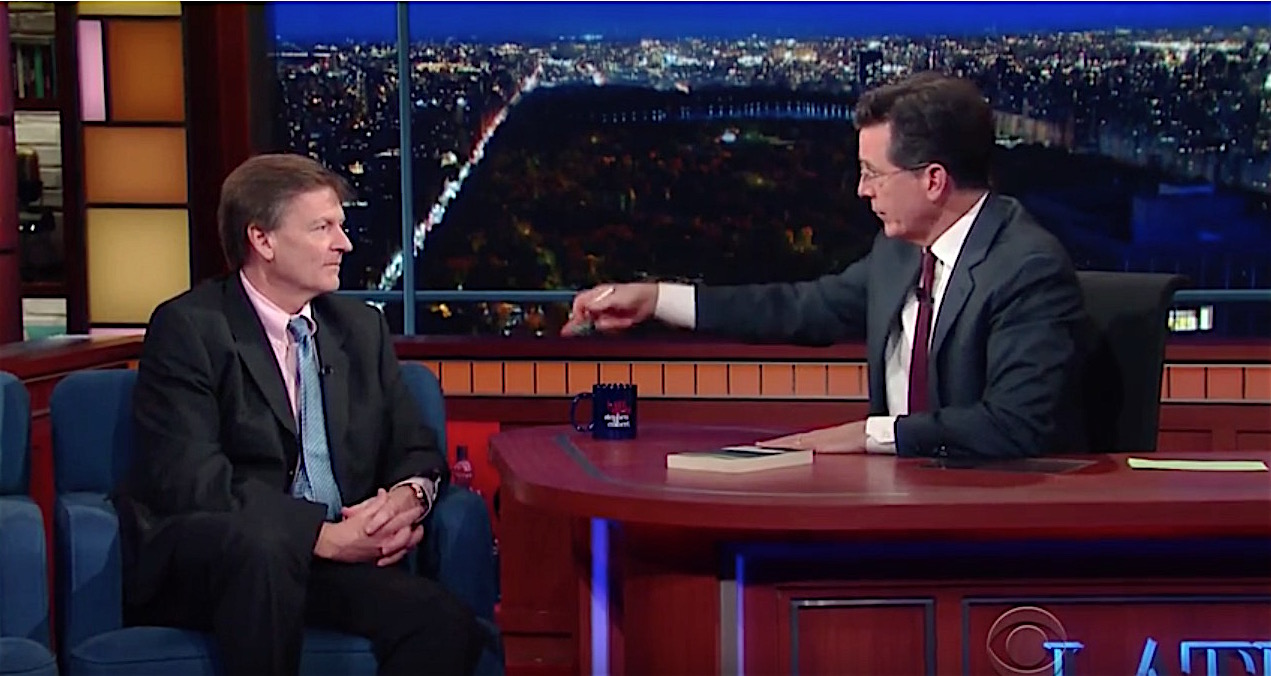Michael Lewis explains to Stephen Colbert why the 2008 bank bailout was a big mistake


A free daily email with the biggest news stories of the day – and the best features from TheWeek.com
You are now subscribed
Your newsletter sign-up was successful
Author Michael Lewis was on Thursday's Late Show to talk about the new movie based on his book The Big Short. He briefly explained the story behind the book, comparing the shorting of mortgage-backed securities to betting someone that their house will burn down. "Don't you have incentive to become an arsonist then?" Colbert asked, and Lewis agreed. People lost their homes in the 2008 crash, but the banks survived because the U.S. bailed them out and didn't break them up, Colbert said, asking: "Was that a bad idea?" Lewis said yes.
Colbert noted that when he interviewed Ben Bernanke, the former Fed chairman said it was the right thing to do, and Hillary Clinton told him the banks shouldn't be bailed out. Lewis sided with Clinton. "I think what they failed to appreciate is that when they resuscitated these places, like let them stay in business, that they would proceed then to not only get bigger, even bigger — that's the amazing thing — but also to start to meddle in the process to reform them, and to sort of like throw their political clout into preventing any kind of change," he said. "It would have been much easier to reform the system if the banks weren't there paying lobbyists, paying politicians to stop it from happening." Watch below to see Lewis ask forgiveness for his own sins, and receive it. Peter Weber
A free daily email with the biggest news stories of the day – and the best features from TheWeek.com
The Week
Escape your echo chamber. Get the facts behind the news, plus analysis from multiple perspectives.

Sign up for The Week's Free Newsletters
From our morning news briefing to a weekly Good News Newsletter, get the best of The Week delivered directly to your inbox.
From our morning news briefing to a weekly Good News Newsletter, get the best of The Week delivered directly to your inbox.
Peter has worked as a news and culture writer and editor at The Week since the site's launch in 2008. He covers politics, world affairs, religion and cultural currents. His journalism career began as a copy editor at a financial newswire and has included editorial positions at The New York Times Magazine, Facts on File, and Oregon State University.
-
 How the FCC’s ‘equal time’ rule works
How the FCC’s ‘equal time’ rule worksIn the Spotlight The law is at the heart of the Colbert-CBS conflict
-
 What is the endgame in the DHS shutdown?
What is the endgame in the DHS shutdown?Today’s Big Question Democrats want to rein in ICE’s immigration crackdown
-
 ‘Poor time management isn’t just an inconvenience’
‘Poor time management isn’t just an inconvenience’Instant Opinion Opinion, comment and editorials of the day
-
 TikTok secures deal to remain in US
TikTok secures deal to remain in USSpeed Read ByteDance will form a US version of the popular video-sharing platform
-
 Unemployment rate ticks up amid fall job losses
Unemployment rate ticks up amid fall job lossesSpeed Read Data released by the Commerce Department indicates ‘one of the weakest American labor markets in years’
-
 US mints final penny after 232-year run
US mints final penny after 232-year runSpeed Read Production of the one-cent coin has ended
-
 Warner Bros. explores sale amid Paramount bids
Warner Bros. explores sale amid Paramount bidsSpeed Read The media giant, home to HBO and DC Studios, has received interest from multiple buying parties
-
 Gold tops $4K per ounce, signaling financial unease
Gold tops $4K per ounce, signaling financial uneaseSpeed Read Investors are worried about President Donald Trump’s trade war
-
 Electronic Arts to go private in record $55B deal
Electronic Arts to go private in record $55B dealspeed read The video game giant is behind ‘The Sims’ and ‘Madden NFL’
-
 New York court tosses Trump's $500M fraud fine
New York court tosses Trump's $500M fraud fineSpeed Read A divided appeals court threw out a hefty penalty against President Trump for fraudulently inflating his wealth
-
 Trump said to seek government stake in Intel
Trump said to seek government stake in IntelSpeed Read The president and Intel CEO Lip-Bu Tan reportedly discussed the proposal at a recent meeting
